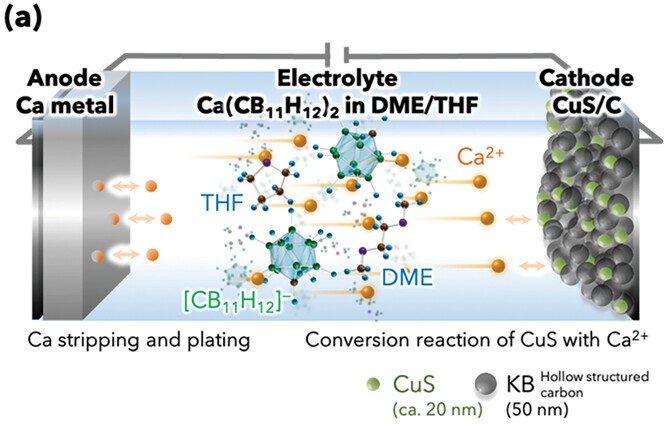Rechargeable calcium metal batteries are emerging as a promising option in the quest for next-generation energy storage devices, which are expected to have higher energy densities and lower costs than existing lithium-ion batteries. However, challenges, such as calcium metal passivation by electrolytes and a lack of cathode materials with efficient calcium ions storage capabilities, impede the technology’s practical development.
To overcome these limitations, researchers at Tohoku University in Japan recently developed a prototype calcium metal rechargeable battery capable of more than 500 cycles of repeated charging and discharging. The battery was developed with a hydride-based electrolyte and copper sulfide (CuS) nanoparticle/carbon composite cathode. It demonstrated better performance than state-of-the-art calcium metal batteries in terms of both the rate capability and cycle life.
The combination of a CuS/C nanocomposite and a tailored monocarborane electrolyte solution of Ca(CB11H12)2 in dimethoxyethane/tetrahydrofuran (DME/THF) enabled a calcium metal battery with capacity retention of 92% based on the capacity of the 10th cycle.
“This study confirms the feasibility of the long-term operation of Ca metal anodes and can expedite the development of Ca metal batteries,” the researchers wrote in “Calcium Metal Batteries with Long Life Using a Hydride-Based Electrolyte and Copper Sulfide Electrode,” which was recently published in Advanced Science.
This content is protected by copyright and may not be reused. If you want to cooperate with us and would like to reuse some of our content, please contact: editors@pv-magazine.com.




By submitting this form you agree to pv magazine using your data for the purposes of publishing your comment.
Your personal data will only be disclosed or otherwise transmitted to third parties for the purposes of spam filtering or if this is necessary for technical maintenance of the website. Any other transfer to third parties will not take place unless this is justified on the basis of applicable data protection regulations or if pv magazine is legally obliged to do so.
You may revoke this consent at any time with effect for the future, in which case your personal data will be deleted immediately. Otherwise, your data will be deleted if pv magazine has processed your request or the purpose of data storage is fulfilled.
Further information on data privacy can be found in our Data Protection Policy.